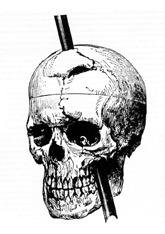AI is another reminder we can't find the ghost in the machine
We often debate when something will become sentient much as we might describe receiving a soul. It seems the question we’re trying to answer is similar to a very old one about human beings - when precisely does the “ghost arrive in the machine”?.
The phrase “ghost in the machine” was coined by Gilbert Ryle to describe René Descartes “mind-body dualism”. It's a way to describe a human being as two parts; a body (a machine) and a soul (a ghost). This concept, and precisely when the two become connected and disconnected defines many aspects of modern western culture. A common feature of religions for example is an afterlife, but “you” can only go to heaven if your soul is separate from your body - there needs to be a ghost in your machine. These problems are not only tidy, theoretical and for theologians but they also form an underpinning for cultural flashpoints, such as if/when abortion is legal and if corporal (even capital) punishment is justifiable.
Mind-body dualism may be ubiquitous in western culture but often it’s used as a shorthand to describe what we know is exceedingly complicated. It’s an abstraction we tell ourselves to move conversations forwards. There are plenty of reasons to believe souls aren’t driving a flesh machine but rather our soul is an emergent property of that flesh machine and our discussions about AI seem likely to fall in a similar (possibly neverending) vein.
We know for sure (ish) that some properties of our corporeal body are not entirely under the dominion of a soul. A doctor can tap your knee and involuntarily to you, it will jerk forwards. There are many parts of the body like this which we group together as the “autonomic nervous system”. The autonomic nervous system controls many things we don’t administer with thoughts like our heart rate, breathing and digestion. This would seem to make it obvious that the autonomic nervous system belongs to the flesh machine, with our thoughts floating somewhere else. It highlights a problem with the ghost being separate from the machine however; some particulars of the autonomic nervous system create or direct thoughts. The most obvious example is pain. When we're in pain we become preoccupied with it - it fills our mind.
Cognitive Behavioural Therapy (CBT) models a person in three levels. These levels are the things you think, the ways you feel and the set of behaviours you have adopted:

This model in one way shows us something obvious - that an activity can make someone anxious, which leads to negative thoughts, which encourages action (like trying to escape). Interestingly however it also shows the reverse; that if you change the way you think you can change how you feel, and this is how we believe CBT works. This reversal illustrates even deeper problems with the ghost in the machine however, because behaviours are intrinsically connected to the “machine” and yet they are connected to thoughts and feelings too. How do you define a soul if the outside world affects our thoughts and feelings?
Defining precisely where the body/soul divide is creates paradoxes for most soul related theories on life. For example, can you be hungry in heaven? If you can, can you be hangry? If you can’t, can you really enjoy food? Is heaven really heaven without hedonism? It's a thought provoking if unresolvable problem.
The first real challenge to the ghost in the machine didn’t come from therapists and philosophers however. It came from Phineas Gage, a rail worker who in a blasting accident suffered serious head trauma and changed personality profoundly in the process. Phineas Gage was unique in that he survived, medical technology was only just reaching the levels required for (some) people to live through this type of brain injury.
 Ouch
Ouch
Sadly some were so inspired by this idea of brain injuries changing behaviour that they went on to inflict a similar brain damage deliberately in the form of lobotomies (see here for a harrowing personal description of this surgery and its aftermath). In the UK we performed about 1500 lobotomies and similar operations a year in the 1950s. Worldwide there are (at least) tens of thousands of people that received lobotomies of some kind, many more than you might expect and a lot of detailed literature exists on their effects.
The most pronounced effect of this frontal lobe damage is often related to motivation - specifically impulses and their inhibition (which is why it was targeted by psychosurgery). It seems something in there stops us from performing actions although we would normally initiate them. For example many lobotomized patients describe problems overlaying social information onto situations - like not realising it’s wrong to walk into someone else’s house to make a cup of tea.
In the case of mind-body dualism this is all a stark reminder that what we consider a person - a personality - is very much influenced by the body that contains it. Descartes died in 1650. We’ve been struggling with the question of a soul separate from the body for nearly 400 years, and yet it seems we are still asking when AI will receive its own ghost. We clearly do not know what the ghost is or even if there is one at all.
"The question of whether a computer can think is no more interesting than the question of whether a submarine can swim.”
Edsger Dijkstra
Relevant resources: